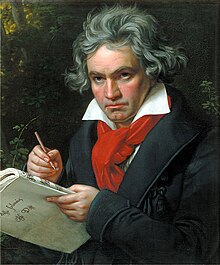Ode to Joy
The Ode to Joy (An die Freude, in German) is a lyrical poetic composition written by Friedrich von Schiller in November 1785 and first published in 1786.
According to a legend of the nineteenth century the oda was to be originally a Ode an die Freiheit (freedom; in the revolutionary epoch students sang it with the music of The Marsellesa) but then became the Ode an die Freude definitively, to broaden its meaning: although the destiny of man is freedom, the full development of that destiny must lead to joy.
The original version included a last stanza that was removed from the posthumous 1808 edition:
| Rettung von Tirannenketten,
Großmut auch dem Bösewicht, Hoffnung auf den Sterbetten, Gnade auf dem Hochgericht! Auch die Toden sollen leben! Brüder trinkt und stimmet ein, Allen Sündern soll vergeben, und die Hölle nicht mehr seyn. | Salvation of tyre chains,
Magnanimity also for the villain, Hope on the deathbed, Pity in supreme judgment. Even the dead will live! Brothers, drink and join me May sinners be forgiven And that hell ceases to exist. |
Two modifications were also introduced in the first stanza:
| Original | Review | Translation of the original | Translation of review | |
|---|---|---|---|---|
| was der Mode Schwerd geteilt | Was die Mode streng geteilt | which divided the sword of custom | which severely divided the custom | |
| Bettler werden Fürstenbrüder | Alle Menschen werden Brüder | beggars will be brothers of princes | All human beings will be brothers |
In 1793, when he was 23 years old, Ludwig van Beethoven was introduced to the work in its original form and immediately wanted to set the text to music, thus giving rise to the idea that would end up being his ninth and last symphony in D minor, Op. 125, whose final movement is for chorus and soloists on the later version of Schiller's “Ode to Joy”. This piece of music has become the European Anthem.
Text (from 1808 version)
Freude, schöner Götterfunken,
| Aus der Wahrheit Feuerspiegel
|
Excerpt from Beethoven for his 9th symphony
In italics Beethoven's introductions.
Original |
|
| Oh friends, let's leave those tones!
Let's intonate more enjoyable and more cheerful! (Beethoven text) Joy, beautiful spark of the Gods, Elisha's daughter. |
| We enter, O heavenly deity, into your temple
drunks of your fire. Your spell casts again What times separated. Men become brothers where your soft wings rest. |
| Whoever had the joy
to be able to count on a friend, who has succeeded in conquering a beloved woman, May your joy join us. Even the one who can call you even a soul on earth. But who has not even accomplished this, Get away from this brotherhood! |
| All beings drink of joy
of nature's abrasive breast. Good as bad, follow her pink path. She gives us kisses and wine and a faithful friend unto death, |
| Fly cheerful like your suns
through the immense heavenly space, follow, brothers, your orbit, cheerful as heroes after victory. |
| Hug millions of brothers!
May this kiss wrap the whole world! Brothers! About the star vault inhabits a loving Father! You know, millions of creatures? Don't you intuit, world, your Creator? Find it through the celestial vault, Your abode must be beyond the stars! |
Contenido relacionado
Joaquin Sabina
Atahualpa Yupanqui
Peter and the wolf
Bjork (book)
Meendiño

